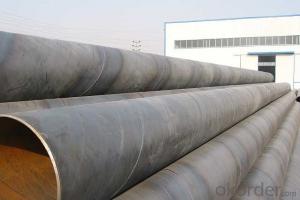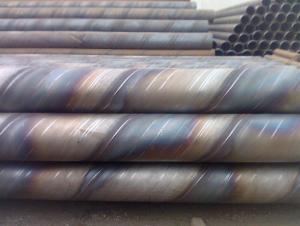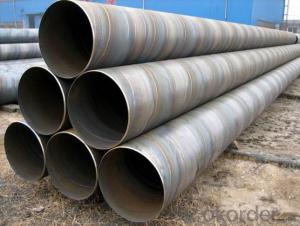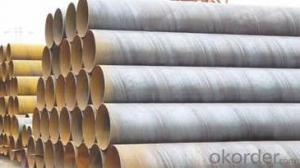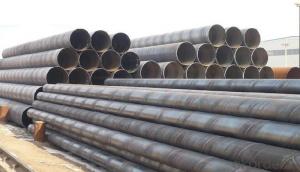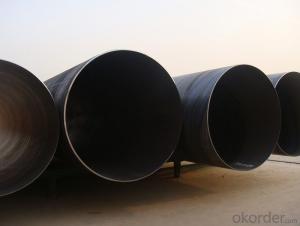SPIRAL STEEL PIPE 52‘‘ ASTM API LARGE DIAMETER PIPE
- Loading Port:
- Tianjin
- Payment Terms:
- TT OR LC
- Min Order Qty:
- 5 m.t.
- Supply Capability:
- 3000 m.t./month
OKorder Service Pledge
OKorder Financial Service
You Might Also Like
Packaging & Delivery
Packaging Detail: | standard export packing or as customer's requirement |
Delivery Detail: | within 10 - 30 days |
Specifications
Spiral Welded Steel Pipes and Tubes
1.Material:Q195-Q235
2.Length:1-12m
3.WT:1.0-14mm
4.O.D.:20-273mm
Spiral Welded Steel Pipes and Tubes
Product Description:
1.Material : Q235,Q345,L245,L290,L360,L415,L450,L485,GrB,X42,46,X52,X56,X60,X65,X70,X80,X100
2,Standard: SY/T5037-2000,GB/T9711-2011,API Spec 5L PSL1/PSL2,ASTM A252\A53,ISO3183,DIN17172,EN10217,JIS G3457,AWWA C200,ASTM A139,ASTM A671,ASTM A672
3.Wall thickness: 3.0mm-30mm
4.Outer diameter: φ168mm-3020mm
5,Length: 5m-12m or as your requirement
6,Corrosion protection standard: DIN30670,DIN30671, AWWAC210, AWWA C203, SY/T0413-2002,SY/T0414-2002
7,Application: Oil, gas, natural gas, water pipe, thermal electricity pipe, steel structure engineering, etc
Q195-q345 Material Steel Pipe's Materials
Elements | Chemical Compsition% | Mechanical Property | ||||||
C% | Mn% | S% | P% | Si% | Yield Point (Mpa) | Tensile Strength(Mpa) | Elongation | |
Q195 | 0.06-0.12 | 0.25-0.50 | <0.050< span=""> | <0.045< span=""> | <0.030< span=""> | >195 | 315-430 | 32-33 |
Q215 | 0.09-0.15 | 0.25-0.55 | <0.05< span=""> | <0.045< span=""> | <0.030< span=""> | >215 | 335-450 | 26-31 |
Q235 | 0.12-0.20 | 0.30-0.70 | <0.045< span=""> | <0.045< span=""> | <0.030< span=""> | >235 | 375-500 | 24-26 |
Q345 | <0.20< span=""> | 1.0-1.6 | <0.040< span=""> | <0.040< span=""> | <0.55< span=""> | >345 | 470-630 | 21-22 |
- Q: How are steel pipes protected against galvanic corrosion?
- Steel pipes are protected against galvanic corrosion through various methods including the application of protective coatings such as zinc or epoxy, cathodic protection systems, and the use of corrosion inhibitors.
- Q: Can steel pipes be used for underground water supply?
- Yes, steel pipes can be used for underground water supply. Steel pipes are strong, durable, and resistant to corrosion, making them suitable for various applications, including underground water supply. However, it is important to use steel pipes that are specifically designed for underground use and are coated or lined to prevent corrosion. Additionally, proper installation and maintenance are crucial to ensure the long-term integrity and functionality of the steel pipes in an underground water supply system.
- Q: Can steel pipes be used for conveying sewage sludge?
- Indeed, sewage sludge can be conveyed using steel pipes. Steel pipes possess several properties that render them suitable for this purpose. Firstly, their strength and durability enable them to endure the pressure and weight of sewage sludge without collapsing or fracturing. This is of utmost importance as sewage sludge can be quite heavy and may contain solids that could exert stress on the pipes. Secondly, steel pipes exhibit resistance to corrosion, which is crucial when conveying sewage sludge that frequently contains corrosive components. By utilizing corrosion-resistant steel pipes, one can ensure a prolonged lifespan and minimize the risk of leaks or damage. Moreover, steel pipes can be manufactured in various sizes and diameters, granting flexibility in the design of sewage systems to meet specific requirements. Nonetheless, it is vital to emphasize the necessity of proper maintenance and regular cleaning to prevent sludge buildup and maintain the pipes' efficiency.
- Q: How are steel pipes used in the textile industry?
- Steel pipes are used in the textile industry for various purposes, including the transportation of water, steam, and chemicals, as well as for the distribution of compressed air. They are also used in the construction of machinery and equipment, such as dyeing machines and fabric stretching frames. Additionally, steel pipes are utilized for the installation of heating and cooling systems in textile factories.
- Q: How are steel pipes used in the construction of nuclear power plants?
- Steel pipes are used in the construction of nuclear power plants for various purposes, including transporting coolant, steam, and gases, as well as providing structural support for the overall system. These pipes are specifically designed to withstand high pressures, extreme temperatures, and corrosive environments, ensuring the safe and efficient operation of the nuclear power plant.
- Q: Can steel pipes be used for conveying gases?
- Indeed, gases can be conveyed using steel pipes. In different industries, such as oil and gas, petrochemical, and construction, steel pipes are commonly employed to transport a wide range of gases, including natural gas, air, and hydrogen. The use of steel pipes for gas transportation offers numerous benefits. They possess exceptional strength and durability, enabling them to withstand rigorous pressure and temperature conditions. Moreover, steel pipes exhibit remarkable resistance to corrosion, effectively preventing gas leakage and ensuring the safety and dependability of the gas transportation system. Furthermore, their smooth internal surface minimizes frictional resistance, facilitating efficient gas flow. As a result, steel pipes are a reliable and extensively-utilized choice for conveying gases across diverse applications.
- Q: Can steel pipes be used for petrochemical plants?
- Yes, steel pipes can be used for petrochemical plants. Steel pipes are often preferred in petrochemical plants due to their high strength, durability, and resistance to corrosion, making them ideal for handling various chemicals and substances involved in petrochemical processes. Additionally, steel pipes can withstand high pressure and temperature conditions commonly encountered in petrochemical plants, making them a reliable choice for transporting fluids and gases.
- Q: Can steel pipes be used for high-pressure applications?
- Yes, steel pipes can be used for high-pressure applications. Steel is known for its strength and durability, making it suitable for handling high-pressure fluids or gases in industries such as oil and gas, chemical processing, and power generation. The use of steel pipes ensures reliable performance and reduces the risk of leaks or ruptures even under high pressure conditions.
- Q: What is the maximum operating temperature for steel pipes?
- The maximum operating temperature for steel pipes can vary depending on the grade of steel used, but it is generally around 1000°C (1832°F) for standard carbon steel pipes.
- Q: What is the fire rating of steel pipes?
- Several factors determine the fire rating of steel pipes. Steel possesses inherent fire resistance due to its high melting point and low thermal conductivity. However, the fire rating of steel pipes can be further improved by employing fire-resistant coatings or insulation materials. These additional measures can offer different levels of fire protection, typically quantified by how long the pipes can retain their structural integrity during a fire situation. The precise fire rating of steel pipes may differ depending on the thickness and type of coating or insulation employed. To ascertain the appropriate fire rating requirements for specific applications, it is crucial to refer to industry standards, such as those established by organizations like the National Fire Protection Association (NFPA), or consult with fire safety professionals.
Send your message to us
SPIRAL STEEL PIPE 52‘‘ ASTM API LARGE DIAMETER PIPE
- Loading Port:
- Tianjin
- Payment Terms:
- TT OR LC
- Min Order Qty:
- 5 m.t.
- Supply Capability:
- 3000 m.t./month
OKorder Service Pledge
OKorder Financial Service
Similar products
Hot products
Hot Searches
Related keywords
